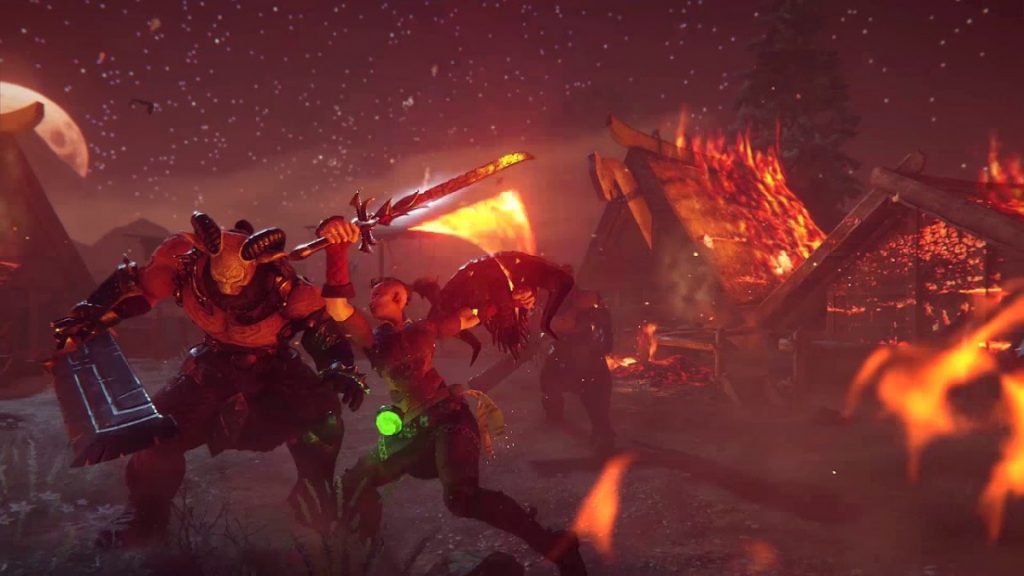

And because each stage is randomized, you never know how each adventure is going to play out. Sometimes you'll discover a sword in a canyon or be given better items by a friendly stranger.

Players start out with the most basic equipment, but will find better weapons and armor through completing side quests and opening treasure chests. What's more, many weapons have a secondary attack, which can help flip a losing fight back in your favor. Our hero can swing his weapon, stun enemies, reverse attacks and leap out of the way. Influenced by the combat in Batman's Arkham series, Hand of Fate is heavy on button mashing and quick counters. Many cards will require a fight, which sends us into a third-person skirmish set in small fantasy-themed arenas. Of course, it's not as simple as walking from one space to the next. The idea is to travel around the board until you eventually find the hideous boss creature. Each space you step on uncovers some sort of action, be it talking to a drunkard at the tavern or getting ambushed by enemies. Each of the 12 stages play out across mostly linear paths made out of cards. The result is a clever mash-up that defies genre classification and proves that Defiant is a company worth keeping an eye on.Īt its core, Hand of Fate is a single-player board game. Now they are making their home console debut with Hand of Fate, a devastatingly addictive adventure game that mixes card collecting with fast-paced third-person action. Based out of Brisbane, this small team of industry veterans has been sharpening its teeth on quirky downloadable titles for smartphones. The King of Dust, for example, is a vicious bandit lord, while the Queen of Skulls is a powerful skeletal warrior woman.Chances are you've never heard of Defiant Development. That court card is the boss creature that must be beaten to win.

The main story quests begin by selecting one of the court cards - the Jacks, Queens, and Kings - which then builds a deck of cards to match. Many of the cards build up these ongoing narratives, and they greatly add to the playing experience.Įach adventure lasts between 10 minutes and an hour, making this an excellent short-session game for players with minimal spare time. If you help them be together, a token is awarded, and that token unlocks an "angry father" card, which continues the story. An example is a card that tells the story of two young lovers forbidden from being together by their families. The tokens add a wonderful sense of continuity to the game, as they unlock new cards which can then be added to the deck in future plays. There is no lasting punishment for failure, and collected rewards - in the form of metal tokens rewarded for successfully beating a card - are not lost upon death.

Thankfully, even when Lady Luck is not smiling down and an adventure ends in a sudden shower of blood or, even worse, an ignominious death from starvation, all is not lost. Too many adventures come to an abrupt end because of a completely random draw of the cards, and that simply is not fun. However you define it, it is extremely addictive and rewards strategic planning and thoughtful play, but it can also be frustratingly difficult and, too often, monumentally unfair. The game becomes a 3D action brawler when fights break out. It is all of these things and none of them at the same time. It feels like many different things at different moments: fantasy action brawling, virtual gambling, interactive fiction, and even a digital board game. Something this new and unique is very hard to place squarely into any one genre. So it is an action game, at least to a degree. Some fights will even employ multiple cards, forcing the player to defend against a mix of bandits and rat-men, for example. A two of skulls pits the player against a pair of skeletons, while a three of scales sees them attacked by a trio of cold-blooded lizard-men. But this is not a role-playing game - not exactly.įights are defined by the card that has been flipped over. There are also resources to collect and manage - gold, food, and healing - and powerful magical weapons and artefacts to find and wield. Others will throw the player into a battle, requiring them to make clever use of the weapons and equipment they have collected on the journey so far. Some cards will be a kind of "choose your own adventure" mini-story, such as an encounter with a beggar, or stumbling through a magical circus. Moving the player's token onto a card flips it face-up, and the events described on the card take place - but this is not a board game. Each card is a location on the map - a dungeon, a castle, a town, and so on. Instead of drawing a hand and playing cards as one might expect, the cards are placed face-down on a virtual tabletop, forming a simple map. Cards represent areas, creatures, story events and items.


 0 kommentar(er)
0 kommentar(er)
